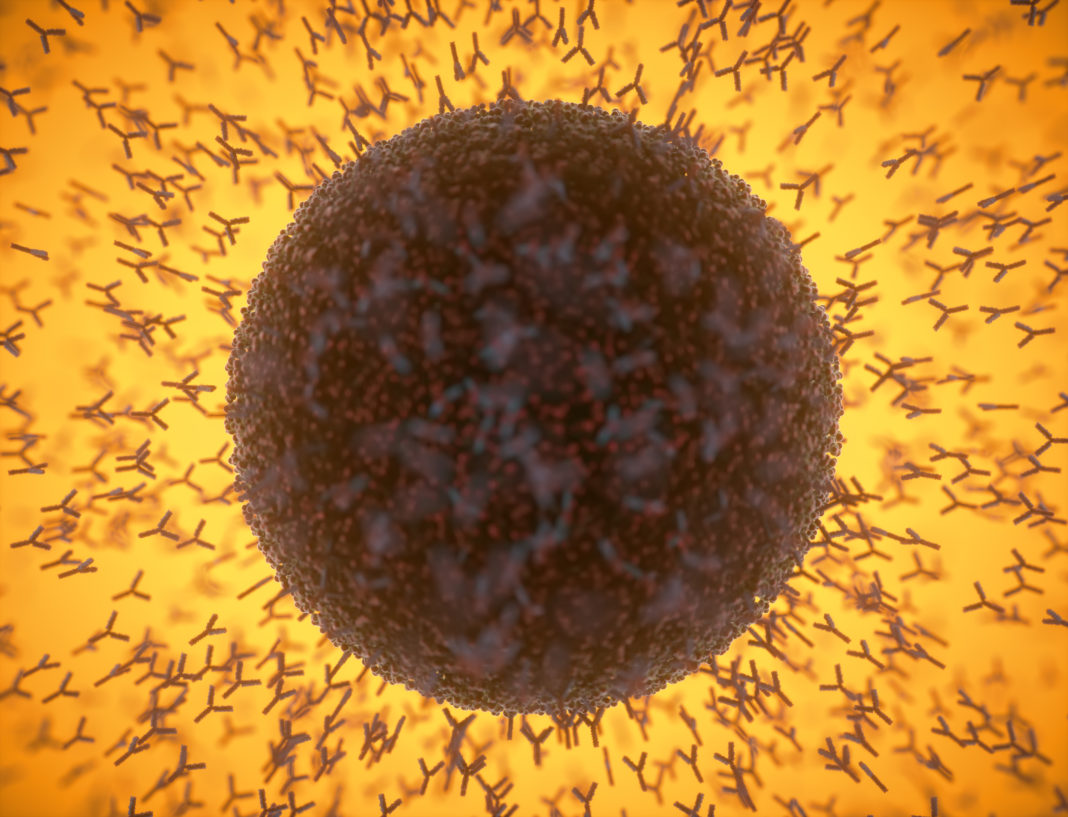The Coronavirus Immunotherapy Consortium (CoVIC), an academic-industry, non-profit collaborative research effort, has analyzed antibodies to SARS-CoV-2 that may offer an advantage over traditional antibodies. Originally discovered by Twist Bioscience, the antibodies were found to have potent effects on multiple SARS-CoV-2 variants.
One antibody candidate TB202-3 (CoVIC-094), demonstrated binding to diverse SARS-CoV-2 variant mutations, including strains with the E484K, N501Y, D614G, Y453F, and K417N mutations in pseudovirus assays, indicating this therapeutic antibody may be effective in treating many strains of COVID-19.
The results are published in Science, in the article, “Defining variant-resistant epitopes targeted by SARS-CoV-2 antibodies: A global consortium study.”
CoVIC used high-throughput surface plasmon resonance analysis and cryo-EM structural determination, sorting antibodies that react within the SARS-CoV-2 receptor-binding domain (RBD) into 7 different “communities” (RBD-1 through RBD-7). Antibodies in the RBD-4 community bind to the outer face of the RBD and can do so in either the “up” or “down” RBD conformation. Monoclonal antibodies that target RBD-4 bind towards the outer edge of the receptor-binding motif and can block binding to ACE2 on human cells, the entry point for the virus. Select properties of RBD-4 antibodies indicate they may have increased potency against the virus.
COVID-19 continues to evolve, spurring additional mutations and viral strains. TB202-3 binds to a majority of known mutations, with the exception of the L452R mutation present in the Delta and Epsilon variants. Twist developed a new VHH single domain antibody, TB339-031, with a similar structure and potency to TB202-3, which also binds and neutralizes the Delta and Epsilon variants, and that is now advancing through late-stage discovery and validation testing.
“Applying our proprietary drug discovery and optimization platform, we identified and advanced TB202-3 through preclinical studies and submitted this antibody to CoVIC for comprehensive testing in comparison to others,” said Emily Leproust, PhD, CEO and co-founder of Twist Bioscience. “With the continuous emergence of variant strains of SARS-CoV-2, antibodies that bind to regions away from the areas of frequent mutation will be critical to the ongoing global response. While broad-spectrum is a term used most often in relation to antibiotics, it applies here to Twist’s antibodies, as they show efficacy in neutralizing a wide range of SARS-CoV-2 variants.”
“These comprehensive results show that TB202-3 may be more resistant to receptor-driven selection pressure and Twist antibodies may work therapeutically against emerging SARS-CoV-2 variants,” continued Leproust. “In addition to binding location and neutralization efficacy, due to its small size, selectivity, and preclinical efficacy, Twist antibodies may offer an advantage over traditional antibodies as they can be an integral component of a bispecific antibody or can be used with other antibodies. COVID-19 infection continues to spread throughout the world, and new therapeutic options will be required to treat emerging variants.”
Previous studies of TB202-3, a single domain VHH “nanobody,” demonstrated protection against weight loss, a key indicator of disease severity, at the lowest dose of 1 mg/kg in a preclinical hamster challenge model. Immunosuppressed animals were given 1, 5, or 10 mg/kg of each of the Twist antibodies and were assessed for weight loss. Animals treated with all doses of TB202-3 were protected against weight loss, whereas control animals lost a mean of 11.7% of their body weight. Validation and late-stage discovery studies continue for TB339-031.
With VHH-based antibodies able to exhibit pharmaceutically-relevant properties comparable to IgGs, they are a promising therapeutic with several advantages over their bulkier, more complex counterparts. They are also more thermally and chemically stable, making VHH-based therapeutics good candidates to address respiratory infections, administered by inhaler directly to the respiratory tract where the infection is concentrated. In addition, the small size simplifies the manufacturing of VHH antibodies.



